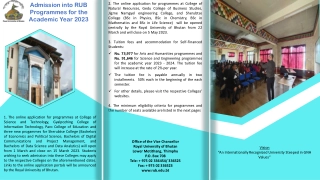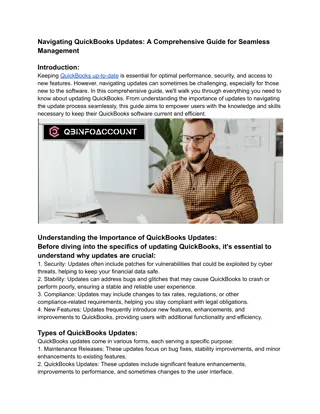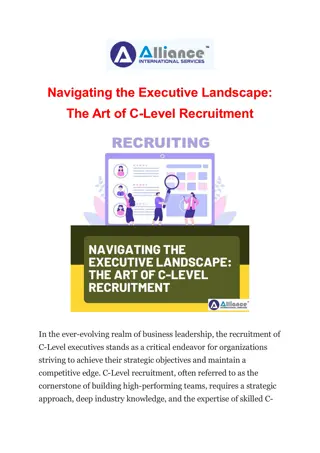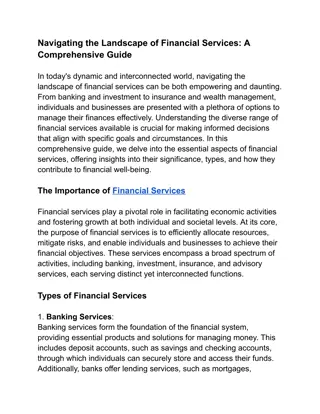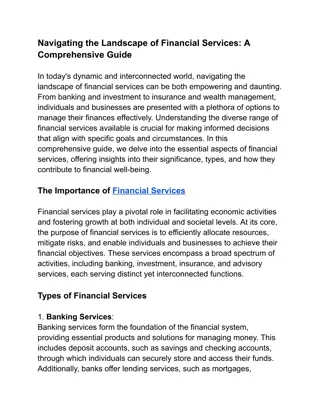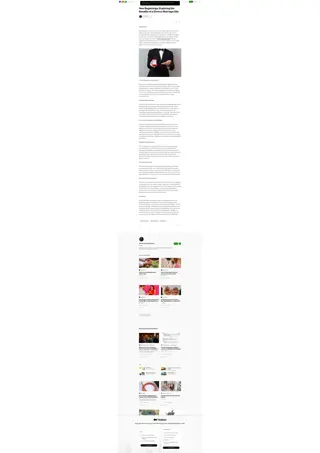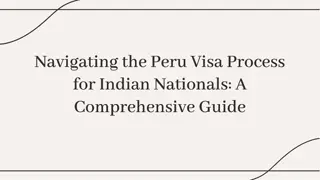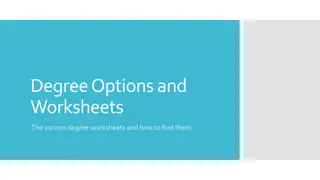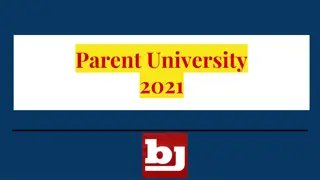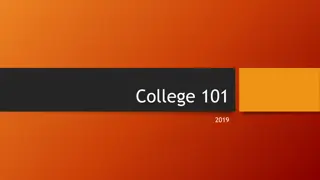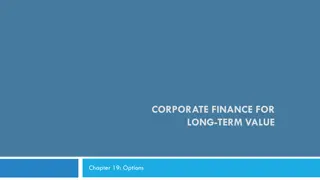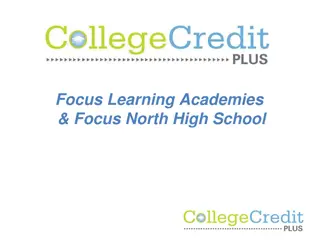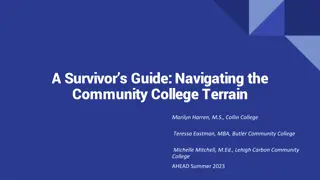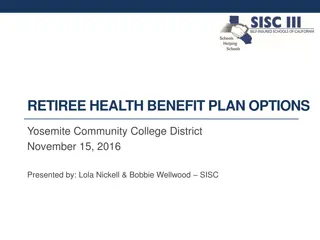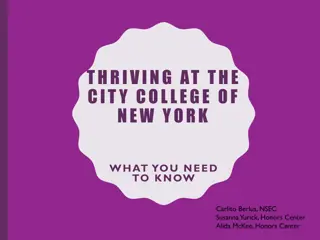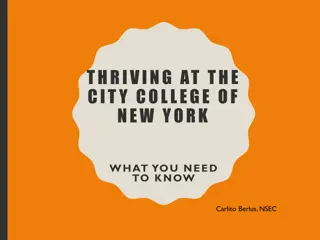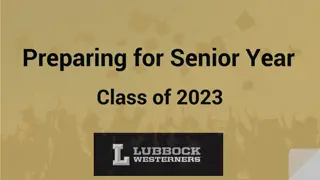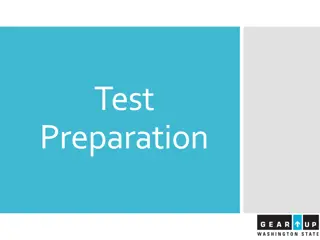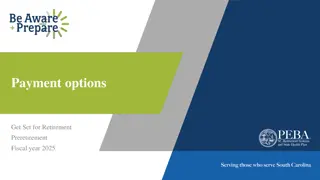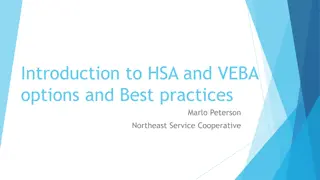Navigating College Options: A Comprehensive Guide
With over 3,700 two- and four-year colleges in the United States, choosing the right college can be overwhelming. Explore various options after high school, compare in-state vs. out-of-state choices, understand the differences between public and private institutions, and learn about tuition discounts and scholarships. Make an informed decision that aligns with your educational and career goals.
Download Presentation

Please find below an Image/Link to download the presentation.
The content on the website is provided AS IS for your information and personal use only. It may not be sold, licensed, or shared on other websites without obtaining consent from the author. Download presentation by click this link. If you encounter any issues during the download, it is possible that the publisher has removed the file from their server.
E N D
Presentation Transcript
COLLEGE SELECTION 101 How do I pick a college??
SO MANY CHOICES!! There are over 3,700 two and four years colleges in the United States. How do I find my school??
OPTIONS AFTER HIGH SCHOOL 4 year college/university 2 year community/junior college Technical/Trade School Military Employment
4 YEAR COLLEGES In-State or Out-Of-State Public vs Private Conservatory vs Liberal Arts or Hybrid Credited vs Unaccredited
IN STATE VS OUT OF STATE Truman State Northwest Missouri State $18,791 Mizzou Missouri State Lindenwood Webster SIUE Carnegie Mellon (PA) Columbia College (IL) Tulane (LA) AMDA (NYC) NC School of Arts Central Florida $16,014 $22,489 $25,111 $41422 $22,346 $26,140 $15,586 $25,132 $37,615 $18,520 $65,580 $37,888 $64,854 $40,820 $12,400 $6,550 $29,463 $27,985 $16,180
TUITION DISCOUNTS MIDWEST STUDENT EXCHANGE PROGRAM Provides more affordable opportunities for students to attend out-of-state institutions Public institutions agree to charge no more than 150% of in-state resident tuition rate Private institutions offer a 10% reduction on tuition rates Illinois, Indiana, Kansas, Michigan, Minnesota, Missouri, Nebraska, North Dakota & Wisconsin
PUBLIC VS PRIVATE PUBLIC Size: typically larger Tuition: State funded = lower tuition Scholarships: less Degrees: wide variety; traditional liberal arts and specialized technical fields Class size: large (200) Demographics: more instate students (lower cost) Admission: less selective PRIVATE Size: typically smaller (few thousand sometimes) Tuition: Private Contributions= higher tuition Scholarships: more Degrees: smaller variety with academic focus (fine arts, engineering, computer science, liberal arts) Class size: small (15) Demographics: more diverse Admission: more selective
PUBLIC VS PRIVATE COMPARISON MISSOURI STATE University $15,586 Scholarships - $2000 18,980 undergrads LINDENWOOD UNIVERSITY $25,132 Scholarships - $10,000 8,285 undergrads NORTHWEST MO STATE $18,791 Scholarships - $3000 5,618 undergrads WEBSTER UNIVERSTY $37,615 Scholarships- 2,766 undergrads
CONSERVATORY VS LIBERAL ARTS CONSERVATORY Shorter program More specialized Degree in Scenic Design BFA Few General Ed Courses 100% focused on performance More Expensive Audition to stay in Program Selective process to casting LIBERAL ARTS 4 year program Generalized Degree in Technical Theatre A lot of General Ed Courses Focused split; academic and performance Less Expensive Everyone stays in program More opportunities to be cast
HYBRIDS WHAT IS A HYBRID? Liberal Arts colleges that house their own conservatories NY University s Tisch School of the Arts University of Michigan s School of Music, Theatre & Dance
CREDITED VS NON-ACCREDITED CREDITED Associate s Degree Bachelor's Degree Master s Degree Doctoral Dregree NON-ACCREDITED Certificates and Degrees Advantages: 1. Cheaper 2. Shorter 3. Easier Disadvantages: 1. Not applicable for Grad school admission 2. Risk not being hired
FACTORS WHEN CHOOSING A COLLEGE Distance from home Setting (urban, suburban, rural) Campus Life Opportunity to participate Size of School Academics-majors Admission Criteria Cost-Scholarships/Financial Aid
SIZE OF SCHOOL The Big school-pros and cons The Small school-pros and cons Is there a middle-sized school?
ACADEMICS/MAJORS What majors does the college offer? BA or BFA or BSED What if I am undecided? Do I have to apply for general admission and for my specific major? Can I graduate college in 4 years?
TYPES OF DEGREES BACHELOR OF ARTS (BA) Type: academic Length: 4 yrs Coursework: Liberal Arts 2/3 -general edu, liberal arts, electives 1/3- specialty Adv: 1. Provides room for a 2nd major 2. more well rounded individual = greater career options BACHELOR OF FINE ARTS (BFA) Type: Professional Length: 4 yrs Coursework: FA major 1/3 gen ed 2/3 specialty Adv: Students have more experience in specialized area
COMPARE PROGRAMS Drury University BA Theatre (Acting Emphasis) 36 hours Acting 1 & 2 Practicum Stagecraft Directing Research 1 Dance 1 Design 3 Theatre History 2 Electives Missouri State BFA Acting 78 hours Theatre Technology Costume Construction Make-Up 2 Technical Electives Script Analysis Directing 2 Theatre History Acting 1, 2, 3 & 4 Tools of the Actor Intermediate Voice Singing for the Actor Advanced Movement Stage Combat Dialects Auditions Shakespeare Acting for the Camera 2 Theatre Electives Senior Seminar Northwest MO BS Performance 60 hrs 3 Technical skills Practicum Directing 2 Theatre History Voice/Movement Make-Up Advanced Acting Acting Periods/Styles Interpreter s Theatre Performance Elective Senior Seminar Lindenwood BFA Acting 76 hours Acting 1 & 2 Stage Movement Stage Voice Tech Theatre 1 Stage Management Make-Up Script Analysis Directing Modern Drama Survey of Dramatic Lit Theatre History 1 & 2 Voice Lessons Acting Studio 2 Theatre Electives Senior Seminar
Advantages: 2yr program: LA and NY campus Performance based training Industry-focused education experience Disadvantages Cost: $40,000 Reputation Audition to get into program Cuts to stay into program MYTH Yes, it is accredited BFA Degree (New School University) Acting Musical Theatre Dance Performing Arts Conservatory Program The studio program; Acting for the stage, film & TV Integrated program; acting, dance & M. Thtr Dance Theatre
MY FAVORITE PICK PRIVATE Liberal Arts 8,608 undergrads Medium-sized - urban $37,888 (T,R,B) Avg inst aid: $8,200 + state/fed aid Bachelor of Arts: Acting Acting w/ Int. Per Study Comedy writing & Perf Musical Thtr Perf Theatre Theatre Design Theatre Technology Writing for Performance 4 different minors SPECIAL PROGRAMS Comedy Studies a semester at The Second City Main stage Shows 4 theaters, guest artists, student designers Semester in LA International Theatre Program Student-Directed Shows NewStew Shows Work in Chicago and get equity points!!
ADMISSION CRITERIA QUESTIONS How many schools should I apply to? Know admission requirements What does highly selective mean? Requirements to transfer later.. Have a plan School admission requirements vs. Program admissions TIMELINE Feb-May: College visits (view campus life) June-Aug: Write essays Aug-Oct: Apply to schools (most deadlines Nov.1) Oct 1: Apply for FAFSA
COST FINANCIAL AID - SCHOLARSHIP COST Tuition sticker shock Room and Board are separate cost Look for hidden Fees SCHOLARSHIPS Research scholarships now PCH Theatre Scholarship MO Thespians &14,000 PTO Scholarship Parkway NEA (education) Jean Olson (education) Elks Coke-Cola Employer AID FAFSA (oct 1) Need-based vs merit-based Get a a tutor! Higher ACT = more money
FINANCIAL AID COMPARISON GPA 3.2/ACT 24/EFC $15,000 Public (4 Yr) $18,000 - $4,000 (Inst. Aid) Out of Pocket Expense $14,000 (family Private (4 Yr) $32,500 (R,B,T) - $15,000 (Inst. Aid) Out of Pocket Expense $17,000 (family) (R,B,T) Is the $3,000 differential worth the investment for the student and family? EFC = Expected Family Contribution (term that the college financial aid process uses to determine an applicant s eligibility for need-based federal student aid and/or state and college aid
THE CAMPUS VISIT - WHAT SHOULD I ASK? Who teaches your classes: graduate assistants or professors? What is the average class size for freshman? Does tuition include fees? Books-labs-graduation-tech...? Are there sororities/fraternities on campus? Annual cost? What is the diversity of the student body? Can freshmen drive? Parking permit cost? Do meal plans carry over? Used off campus? Does it cost to do laundry? How much? 1818 classes transfer? AP credits? What scholarships are available? ACT/SAT and GPA stats What are the specific admission requirements for both the school and the program?
https://docs.google.com/spreadsheets/d/1ruvpk4Iy-wRLDEFH9CCh5JoRtWKd-k1tnvYl2cSuC0o/edit#gid=0https://docs.google.com/spreadsheets/d/1ruvpk4Iy-wRLDEFH9CCh5JoRtWKd-k1tnvYl2cSuC0o/edit#gid=0
FINAL THOUGHTS Pick a college that fits your educational and social interests and goals. It s all about fit! Do not pick a college because My girlfriend/boyfriend goes there Mom/Dad went there Because Sutton Foster or John Goodman went there Conservatory vs. Liberal Arts Missouri vs. Out of State vs. NY Theatre Education vs. Performance
COLLEGE SEARCH WEBSITES EASY ACCES WEBSITES FASTWEB.COM PETERSONS.COM COLLEGEVIEW.COM BIGFUTURE.COLLEGEBOARD.ORG





